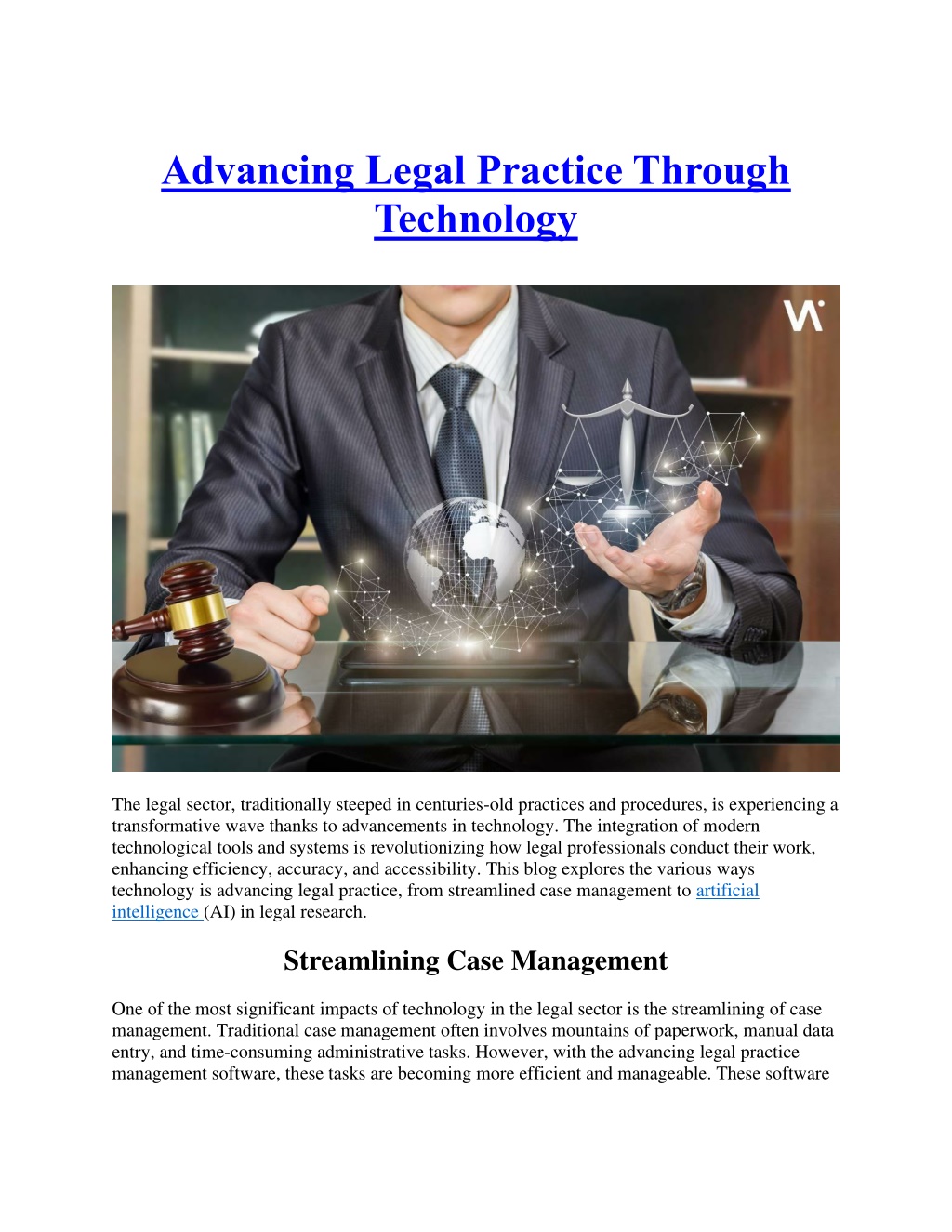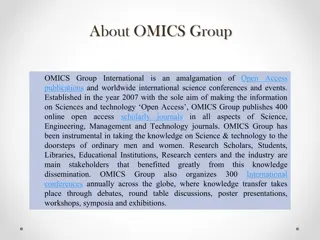
Advancing Legal Practice Through Technology
The legal sector, traditionally steeped in centuries-old practices and procedures, is experiencing a transformative wave thanks to advancements in technology. The integration of modern technological tools and systems is revolutionizing how legal prof
Download Presentation

Please find below an Image/Link to download the presentation.
The content on the website is provided AS IS for your information and personal use only. It may not be sold, licensed, or shared on other websites without obtaining consent from the author. Download presentation by click this link. If you encounter any issues during the download, it is possible that the publisher has removed the file from their server.
E N D
Presentation Transcript
Advancing Legal Practice Through Technology The legal sector, traditionally steeped in centuries-old practices and procedures, is experiencing a transformative wave thanks to advancements in technology. The integration of modern technological tools and systems is revolutionizing how legal professionals conduct their work, enhancing efficiency, accuracy, and accessibility. This blog explores the various ways technology is advancing legal practice, from streamlined case management to artificial intelligence (AI) in legal research. Streamlining Case Management One of the most significant impacts of technology in the legal sector is the streamlining of case management. Traditional case management often involves mountains of paperwork, manual data entry, and time-consuming administrative tasks. However, with the advancing legal practice management software, these tasks are becoming more efficient and manageable. These software
solutions offer a centralized platform where legal professionals can organize and access all case- related information, track deadlines, manage client communications, and automate routine tasks. For instance, platforms like Clio and MyCase provide comprehensive tools for document management, billing, and client communication, allowing lawyers to focus more on substantive legal work rather than administrative duties. The automation of routine tasks, such as scheduling and document generation, not only saves time but also reduces the likelihood of human error, leading to more accurate and reliable outcomes. Enhancing Legal Research with AI Legal research is a cornerstone of legal practice, requiring thorough examination of statutes, case law, and legal precedents. Traditionally, this process could take hours or even days, demanding meticulous attention to detail and extensive manual labor. Enter AI-powered legal research tools, such as ROSS Intelligence and LexisNexis. These AI-driven platforms utilize natural language processing and machine learning algorithms to sift through vast databases of legal information, quickly identifying relevant cases and statutes. They can provide answers to complex legal queries in a fraction of the time it would take a human researcher, significantly enhancing the efficiency and accuracy of legal research. Moreover, these tools continue to learn and improve over time, becoming increasingly adept at understanding the nuances of legal language and concepts. E-Discovery: Revolutionizing Evidence Collection
E-discovery, or electronic discovery, is another area where technology is making a profound impact. E-discovery involves the identification, collection, and analysis of electronically stored information (ESI) for use as evidence in legal cases. Given the exponential growth of digital data, traditional methods of discovery are often inadequate. Advanced e-discovery tools, such as Relativity and Ever law, leverage AI and machine learning to quickly process and analyze large volumes of digital data. These tools can identify relevant documents, emails, and other forms of electronic communication, even when they are buried within terabytes of data. This not only speeds up the discovery process but also ensures that no critical piece of evidence is overlooked. Virtual Law Firms and Remote Work The rise of cloud computing and communication technologies has given birth to the concept of virtual law firms. These firms operate primarily online, with lawyers and staff working remotely from various locations. This model offers numerous benefits, including reduced overhead costs, increased flexibility, and the ability to serve clients from anywhere in the world. Cloud-based platforms, such as Practice Panther and Rocket Matter, provide the necessary infrastructure for virtual law firms to operate efficiently. These platforms offer secure document storage, real-time collaboration tools, and integrated billing systems, enabling lawyers to manage their practice from any device with internet access. The ability to work remotely has also proven invaluable during situations like the COVID-19 pandemic, ensuring continuity of service while adhering to social distancing guidelines.
Cybersecurity in Legal Practice As legal practices become more reliant on technology, cybersecurity has emerged as a critical concern. Law firms handle sensitive and confidential information, making them prime targets for cyberattacks. A breach of client data can have severe legal and reputational consequences. To mitigate these risks, legal professionals are adopting robust cybersecurity measures, including encryption, multi-factor authentication, and secure communication channels. Additionally, cybersecurity training for staff is becoming standard practice, ensuring that everyone within the firm understands the importance of data security and how to recognize potential threats. Platforms like Abacus Private Cloud offer secure cloud hosting specifically tailored for law firms, providing peace of mind that client data is protected. Improving Access to Justice Technology is also playing a pivotal role in improving access to justice. Legal services have traditionally been expensive and difficult to obtain for many individuals. However, online legal services and self-help tools are making legal assistance more accessible and affordable. Websites like LegalZoom and Rocket Lawyer offer a range of legal services, from document preparation to virtual consultations with licensed attorneys. These platforms provide a cost- effective alternative for individuals and small businesses who might otherwise be unable to afford traditional legal services. Moreover, AI-powered chatbots and virtual assistants can guide
users through simple legal processes, further democratizing access to legal information and support. Blockchain and Smart Contracts Blockchain technology, best known as the foundation for cryptocurrencies like Bitcoin, is also finding applications in the legal sector. Blockchain offers a secure and transparent way to record transactions and agreements, which is particularly useful for creating and enforcing smart contracts. Smart contracts are self-executing contracts with the terms of the agreement directly written into code. These contracts automatically execute and enforce themselves when predefined conditions are met, reducing the need for intermediaries and minimizing the risk of disputes. Platforms like Ethereum are enabling the development of smart contracts for various legal applications, from real estate transactions to intellectual property management. The Future of Legal Education The integration of technology into legal practice is also influencing legal education. Law schools are increasingly incorporating technology courses into their curricula, preparing future lawyers to navigate a tech-driven legal landscape. Courses on e-discovery, legal research with AI, and
cybersecurity are becoming standard offerings, ensuring that new lawyers are equipped with the skills they need to thrive in a modern legal environment. Additionally, continuing legal education (CLE) programs are evolving to include technology training for practicing lawyers. These programs help legal professionals stay up-to-date with the latest technological advancements and best practices, ensuring they can leverage new tools to enhance their practice. Conclusion The advancement of legal practice through technology is reshaping the legal landscape in profound ways. From streamlining case management and enhancing legal research to improving access to justice and ensuring data security, technology is enabling legal professionals to work more efficiently and effectively. As the legal sector continues to embrace technological innovations, the future promises even greater improvements in how legal services are delivered and consumed. Legal professionals who adapt to these changes will be well-positioned to thrive in this evolving environment, ultimately benefiting their clients and the justice system as a whole. Uncover the latest trends and insights with our articles on Visionary Vogues






















